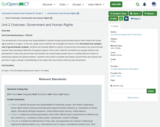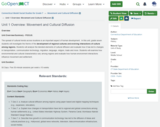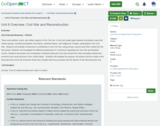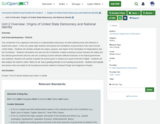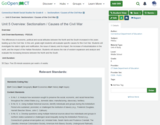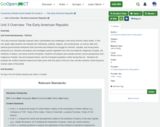CSDE Model Curricula Quick Start GuideThe Organization and Alignment of Grade-specific CT Core StandardsEquitable and Inclusive Curriculum The CSDE believes in providing a set of conditions where learners are repositioned at the center of curricula planning and design. Curricula, from a culturally responsive perspective, require intentional planning for diversity, equity, and inclusion in the development of units and implementation of lessons. It is critical to develop a learning environment that is relevant to and reflective of students’ social, cultural, and linguistic experiences to effectively connect their culturally and community-based knowledge to the class. Begin by connecting what is known about students’ cognitive and interdisciplinary diversity to the learning of the unit. Opposed to starting instructional planning with gaps in students’ knowledge, plan from an asset-based perspective by starting from students’ strengths. In doing so, curricula’s implementation will be grounded in instruction that engages, motivates, and supports the intellectual capacity of all students.Standards-based Social Studies Instruction Standards-based social studies instruction at the kindergarten (K) through Grade12 levels can provide students with the critical content and skills they need to comprehend and impact the challenging and complex world they live in. High quality social studies instruction also allows students to appreciate and understand the cultures of all individuals and groups that reside in our state. Course Description: In grade 8, students study United States history from the American Revolution through Reconstruction. Students investigate conflict and compromise in a growing nation, the emergence of American identity, and the struggle for freedom, equality, and justice over time using disciplinary tools and resources that support planning and developing inquiries, evaluating historical sources, and communication of knowledge and ideas about the nation's history. Questions that should be answered in a course description include: How are democratic ideals reflected in the history of the nation? In what ways has the national identity of the United States been shaped over time? Aligned Core Resources: Core resources are a local control decision. It is imperative that curriculum be implemented using high quality instructional materials to ensure all students meet Connecticut’s standards. Ensuring alignment of resources to the standards is critical for holistic success. There are tools that are available to districts to assist in evaluating alignment of resources, such as CCSSO’s Mathematics Curriculum Analysis Project and Student Achievement Partner’s Instructional Materials Evaluation Tool. In addition, there exist compilations of completed reviews from a variety of resources. Some of these include but are not limited to EdReports, Louisiana Believes, CURATE, and Oregon Adopted Instructional Materials. Connecticut is currently working on providing additional alignment guidance for the most frequently used resources across the state. Additional Course Information: Big ideas addressed in the course: Origins of United States Democracy and National Identity Expansion, Influence, and Economic Growth Civil Unrest, Civil War, and Reconstruction Habits of Mind/SEIH/Transferable Skills Addressed in the Course: The skills you want students to master in their journey to success in college, career, and civic life (e.g., initiative, responsibility, perseverance, collaboration, empathy, respect).The Standards for Social Studies practice are aligned with the C3 Framework and follow the four dimensions of inquiry. The inquiry process is critical for framing the way students learn about history, geography, civics, and economics. The Inquiry Standards of practice describe the thinking processes, habits of mind, and dispositions that students need to develop a strong, critical, and courageous enduring understanding of Social Studies.Central to the C3 Framework is the Inquiry Arc, which frames the ways students learn social studies content. The Inquiry Arc established four dimensions of inquiry: (1) developing questions and planning inquiry, (2) applying disciplinary concepts and tools, (3) evaluating sources and using evidence, and (4) communicating conclusions and taking informed action. The C3 Framework also established four major disciplines in social studies—civics, economics, geography, and history—that form the basis of the second dimension of the Inquiry Arc and that all four major disciplines should be represented within social studies courses. Therefore, the following students should:Develop questions relevant to self, family, and school community. Apply disciplinary knowledge and practices to demonstrate an understanding of social studies content. Gather information to answer a question relevant to self, family, and school community. Use listening and consensus-building and voting procedures to take action in the classroom. It is important to note that the Social Studies curriculum units integrate social, emotional, and intellectual habits. This course will support the following Areas of Development and aim to incorporate learning experiences that will enhance the opportunity for students to: Develop a positive self-concept. Self-Awareness Sense of Self as Competent and capable Develop a positive attitude towards learning Sense of self as a learner Curiosity and initiative Cooperation during learning experiences Identify and understand emotions of self and others Identifying and understanding emotions Empathy Develop positive interpersonal relationships Social awareness and interpersonal skills Responsible decision making and problem solving Conflict resolution Develop executive functioning skills Working memory and metacognition Cognitive flexibility Manage attention and behavior Develop logic and reasoning Please review the Components of Social, Emotional, and Intellectual Habits: Kindergarten through Grade 12 for more details.

